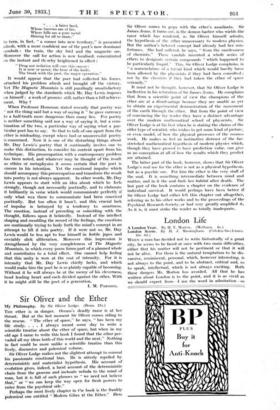Sir Oliver and the Ether
My Philosophy. By Sir Oliver Lodge. (Benn. 21s.) TIIE ether is in danger. Oceain's deadly razor is at her throat. But at the last moment Sir Oliver comes riding to the rescue. "The ether of space," he says, "has been my
life study. I always meant some day to write a scientific treatise about the ether of space, but when in my old age I came to write this book I found that the ether per- vaded all my ideas both of this world and the next." Nothing in fact could be more unlike a scientific treatise than this lively, discursive and polemical volume.
Sir Oliver Lodge makes not the slightest attempt to conceal his passionate emotional bias. He is utterly repelled by deterministic and materialist hypothesis. His account of evolution gives, indeed, a lucid account- of the deterministic 'chain from the gaseous and inchoate nebula to the mind of man, but it is .full of such phrases as "we need not believe that," or "we can keep the way open for fresh powers to enter from the psychical side."
• Perhaps the most lively chapter in the book is the frankly polemical one entitled "Modern Gibes at the Ether." Here
Sir Oliver comes to grips with the ether's assailants. Sir James Jeans, it turns out, is the demon barber who wields the razor which has rendered, as Sir Oliver himself admits', the hypothesis of the ether unnecessary to modern physics. But the author's beloved concept had already had her mis- fortunes. She had suffered, he says, from the carelessness of chemists." These vandals invented a whole series of ethers to designate certain compounds " which happened to be particularly limpid." This, Sir Oliver Lodge complains, is "a nomenclature of a trivial kind which would hardly have been allowed by the physicists if they had been consulted ; nor by the chemists if they had taken the ether of space seriously."
It must not be thought, however, that Sir Oliver Lodge is ineffective in his refutation of Sir James Jeans. He complains that from a scientific point of view the champions of the ether are at a disadvantage because they are unable as yet to obtain an experimental demonstration of the movement of the earth through the ether. But from the point of view of convincing the lay reader they have a distinct advantage over the modern mathematical school of physicists. Sir Oliver Lodge is at his best when he is stating the claims of the older type of scientist, who wishes to get some kind of picture, or even model, of how the physical processes of the cosmos work. He makes us feel an instinctive distrust of the far- stretched mathematical hypothesis of modern physics which, though they have proved to have prediction value, can give us no conception at all of how the results which they predict
are attained. •
The latter part of the book, however, shows that Sir Oliver Lodge's real use for the ether is not as a physical hypothesis, but as a psychic one. For him the ether is the very stuff of the soul. It is something intermediate between mind and matter, and in it the soul finds her habitat after death. The last part of the book contains a chapter on the evidence of individual survival. It would perhaps have been better if Sir Oliver Lodge had either left this chanter out altogether, referring us to his other works and to the proceedings of the Psychical Research Society, or had very greatly amplified it. As it is, it must strike the reader as totally inadequate.










































 Previous page
Previous page